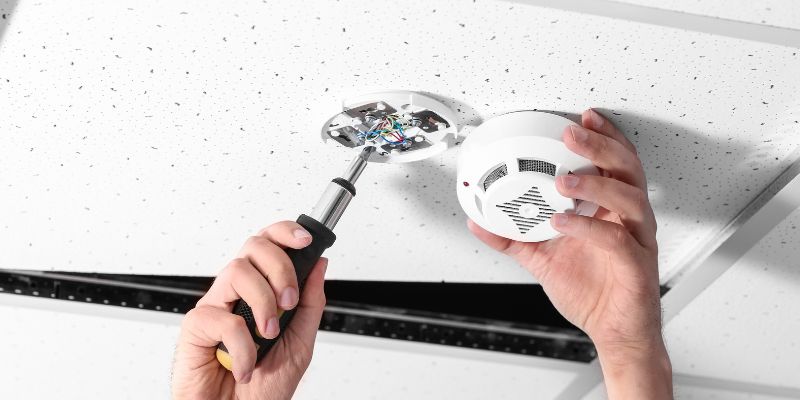You need to test your fire alarm system regularly to guarantee it performs flakily during emergencies. Schedule annual inspections and conduct monthly and quarterly checks to cover all components, from smoke detectors to backup power sources. It’s critical you adhere to established maintenance procedures and verify the sensitivity of detection devices by simulating conditions. Hire trained technicians to perform these tests, ensuring compliance and peak operational effectiveness. Professional service contracts can also enhance the reliability of your fire safety measures, optimizing both compliance and system performance. Understanding these essentials sets the stage for deeper insights into tailored fire safety strategies.
Key Takeaways
- Regular testing ensures detection devices maintain sensitivity and responsiveness to fire conditions.
- Annual inspections are mandatory, with additional monthly and quarterly checks recommended.
- Simulate fire conditions to verify alarm triggers and system functionality.
- Ensure all components, including smoke detectors and backup power sources, are tested.
- Use trained technicians for inspections to guarantee adherence to safety standards.
Guidelines for Fire Alarm Testing
To ensure your fire alarm system operates effectively, you must regularly inspect and test all components, including smoke and heat detectors, annunciator systems, and zone designs. Adhering to established maintenance procedures guarantees that each element functions as intended, thereby maximizing system reliability.
You’ll need to follow specific testing protocols that target the system’s ability to respond accurately during emergencies. This includes verifying the sensitivity and responsiveness of detection devices, which play an essential role in early fire detection and subsequent trigger of alarm systems. Confirm that these devices are free from any obstructions or contaminants that could impair their functionality.
Testing alarm triggers is equally important. You must simulate conditions that these triggers are designed to detect to confirm they activate correctly and promptly. This process helps identify potential malfunctions or weaknesses in the alarm system before they can compromise safety.
To maintain the highest level of reliability, every aspect of your fire alarm system must be scrutinized and tested. This rigorous approach not only keeps the system compliant with safety regulations but also instills confidence that, in the event of a fire, the system will perform as required, safeguarding both property and lives.
Inspection and Testing Frequency
Regular examination and testing frequencies are mandated to maintain the effectiveness of your fire alarm system. To meet compliance standards and guarantee system reliability, you must adhere to established testing schedules and examination requirements.
Typically, your system requires a thorough annual inspection, with additional monthly and quarterly checks recommended depending on the complexity and size of your setup.
Detailed examination requirements demand that every component, from smoke detectors to backup power sources, is tested to verify their operational integrity and responsiveness to fire conditions. This thorough scrutiny is essential not only for safety but also for compliance with local fire codes and insurance policies.
Maintenance needs must also be systematically addressed during these inspections. Components subjected to wear or environmental exposure, such as heat detectors and manual pull stations, require regular servicing to prevent failures. It’s important that these tasks are carried out by trained technicians who can identify potential issues before they escalate into major problems.
Adhering to these prescribed frequencies and standards helps in preempting system failures and ensures a robust response in the event of a fire, thereby safeguarding lives and property.
Service Contracts Overview
Considering the complexity and fundamental nature of maintaining fire alarm systems, investing in a professional service contract is a strategic choice that ensures compliance and operational effectiveness. You’ll find that the contract benefits extend far beyond simple compliance. These contracts are designed to leverage professional expertise, guaranteeing that your system’s reliability is never compromised by inexperience or neglect.
The importance of maintenance can’t be overstated. Regular, expert maintenance prevents system failures and guarantees that your fire alarm system performs at its best when you need it most. It’s not just about meeting legal requirements; it’s about safeguarding your premises and the people within them. With professional technicians handling your system, you tap into their deep understanding of the intricate workings of fire alarm technologies, which varies considerably from one model to another.
Moreover, service contracts are a model of cost efficiency. By agreeing to a maintenance schedule, you avoid the steep costs associated with emergency repairs and system downtime. The reliability of your system remains high, reducing the likelihood of false alarms or failures that could lead to hefty fines or, worse, catastrophic outcomes. Essentially, a service contract is your assurance that you’re not only compliant but also protected.
Fire Safety in Healthcare
Given the vital nature of healthcare environments, guaranteeing that fire safety protocols are meticulously maintained is essential for protecting patients and staff. You must recognize that the safety of patients hinges not just on medical care but equally on a secure environment. This means prioritizing fire safety across all operations.
Firstly, it’s important to focus on critical areas such as ICUs, operating rooms, and areas housing vulnerable patients who mightn’t be able to evacuate quickly. These zones should have the highest standards of fire safety measures in place, including advanced smoke detection systems and highly responsive fire suppression equipment.
Moreover, all medical equipment, known for its complexity and operational necessity, must be regularly checked for fire safety compliance. Faulty equipment can’t only fail but also become a potential source of fire. It’s your responsibility to make sure that these tools don’t transform from life-saving assets to risks.
Staff training is another cornerstone of a robust fire safety strategy. Every member of your team should be well-versed in emergency procedures and the use of fire safety devices. Regular drills and training sessions are essential to keep everyone’s knowledge fresh and response times swift.
Industry-Specific Safety Measures
You must tailor your fire safety measures to meet the specific needs of your industry, guaranteeing all components are compliant with the latest regulations. For commercial buildings, this means integrating a detailed fire alarm system that covers all zones effectively, with special attention to high-traffic areas and emergency exits. Regularly testing and maintaining each element of this system is crucial to guarantee functionality during emergencies.
In food processing facilities, the risks increase due to the presence of combustible materials such as oils and fats. Here, it’s necessary to install heat detectors and suppression systems specifically designed to handle these types of hazards. Your fire safety protocols must include regular audits to check the integrity and cleanliness of these systems, preventing any accumulation that could ignite a fire.
Manufacturing plants and retail spaces require robust fire safety strategies that address both the layout and specific operational risks. Implementing sector-specific solutions, such as spark detection in manufacturing and smoke alarms in storage areas within retail, enhances protection.
Educational institutions must focus on ensuring that alarms are audible in all areas and that evacuation procedures are clear and practiced regularly. It’s vital to engage with fire safety experts who understand the nuances of protecting such diverse environments.
Final thoughts
As you wrap up your fire alarm maintenance routine, remember that regular testing isn’t just ticking boxes—it’s the lifeline of your facility’s safety net.
By adhering to these guidelines and leveraging professional service contracts, you’re not only complying with the law but also forging a shield that protects both property and lives.
Don’t let complacency ignite a disaster; stay vigilant and guarantee your fire safety protocols are as sharp and responsive as a firefighter’s instincts.

